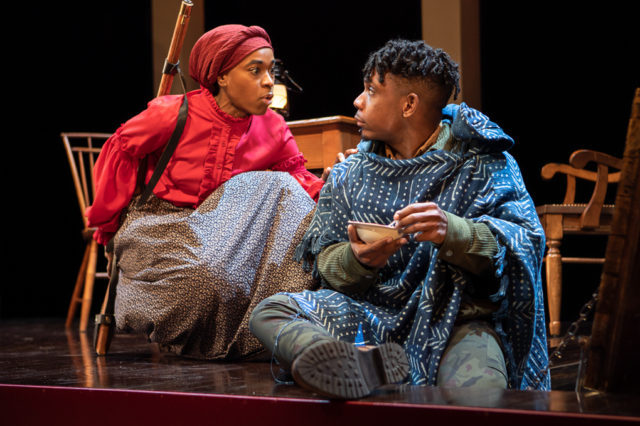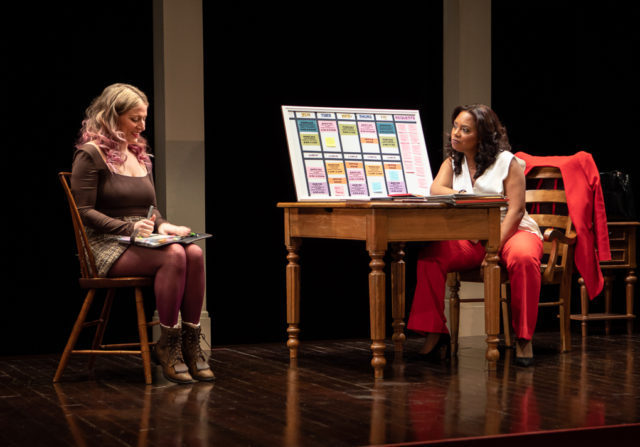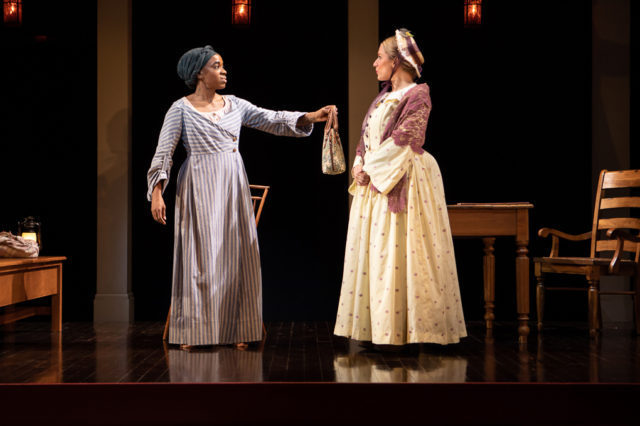
Siblings Sara (Kristolyn Lloyd) and Abner (Elijah Jones) fight for freedom in Confederates (photo by Monique Carboni)
CONFEDERATES
The Pershing Square Signature Center
The Alice Griffin Jewel Box Theatre
480 West 42nd St. between Tenth & Eleventh Aves.
Tuesday – Sunday through April 24, $35-$80
212-244-7529
www.signaturetheatre.org
Playwright Dominique Morisseau and director Stori Ayers magnificently interweave two parallel threads, one that takes place on a plantation during the Civil War, the other at a modern-day university, in the world premiere of Confederates, which opened tonight at the Signature’s Alice Griffin Jewel Box Theatre for an extended run through April 24.
The play begins with tenured Black poly sci professor Sandra (Michelle Wilson) speaking to school leaders — and the audience — projecting a picture of the real-life postcard Type de Negresse d’ADANA, which famously depicts a Black woman breastfeeding a white baby, from more than a hundred years ago. “Before this becomes a complete misinterpretation of intent, I’d like to say that I am not averse to images of slavery,” she announces. “There is nothing slavery that is off limits for me. No shame in my own enslaved heritage. No shame. And yet. . . .” She then switches to a doctored version of the photo, with her head photoshopped onto the Black body, a printout of which had been taped to her office door, and asks for an immediate investigation.
As she departs, the action switches to a slave cabin in the 1860s, where Sara (Kristolynn Lloyd) is stitching a wound suffered by her brother, Abner (Elijah Jones), a runaway slave who is fighting for the Union army. On a raised platform sits a bench chest on one side and a writing desk on the other, surrounded by columns evoking the front of a southern estate. (Rachel Hauck’s set remains the same throughout the play, equating the two time periods.)
Sara wants to join the army too and be useful to the cause, but Abner is having none of it. He tells her, “You good n’ safe with what you do right now. Fast picker. Keep out of the eye of the storm. You like the nighttime nobody seem to notice. That’s good n’ safe. I ain’t got to worry as much.”
Sara insists that Abner train her on how to hold a musket. “So I know what it feels like to have the power of freedom in my hands. ’Case I never see you again,” she says. He shows her and replies, “Now you’re a real man.”

Candice (Kenzie Ross) and Sandra (Michelle Wilson) discuss bias in Dominique Morisseau world premiere (photo by Monique Carboni)
Jones does a quick change and becomes Malik, a Black student arguing a grade with Sandra, his teacher. He is defending his paper, which got a B-, claiming that his unconventional interpretation of Lincoln, the Emancipation Proclamation, and affirmative action is valid. Sandra responds, “I’m saying there are loopholes in your overall analysis of the so-called modern-day plantation in the workforce and its parallel to slavery during the time of the Civil War,” a capsule summary of what the play is about.
“Neither of these policies originally targeted the people it was designed to protect,” he declares. “They both came with multiple side clauses and loopholes. The result, slaves still weren’t freed even after the proclamation, and so-called minorities weren’t employed equally after affirmative action. Paperwork and lies and bullshit and plantation by another name.” She ultimately gives him a chance to rewrite the paper and hand it in the next morning.
Back at the plantation, the master’s daughter, Missy Sue (Kenzie Ross), has returned from her brief, failed marriage with new insight into the condition of slavery; having grown up with Sara, she considers them close friends — Sara most certainly does not feel the same way — and now she wants to work with Sara to spy on her father, the master, and ultimately live together safely in the North. Abner is not happy about this prospect, and Luann (Andrea Patterson), a slave who is sleeping in the master’s bed, starts getting suspicious that something is going on under her nose.
Meanwhile, at the university, Sandra is being accused by numerous people of having bias — Malik thinks she is biased against him; her ditzy, talkative white assistant, Candice (Ross), believes she favors Malik; and her fellow Black professor, Jade (Patterson), has heard that Sandra will not support her tenure vote and feels she treats her more like a threat than a colleague. In addition, everyone has a different opinion, not all of them good, about Sandra having worn a Black Lives Matter T-shirt the other day. Issues of gender, class, and race explode in shocking ways as the poignantly beautiful finale approaches.

Sara (Kristolyn Lloyd) and Missy Ann (Kenzie Ross) confront each other in play that bounces between past and present (photo by Monique Carboni)
Morisseau is one of the most successful and busiest writers of the last decade. In the last ten years, she has given us the Detroit Projects trilogy (Detroit ’67, Paradise Blue, Skeleton Crew), Pipeline, and Ain’t Too Proud — The Life and Times of the Temptations, addressing inequities in housing, business, employment, education, and entertainment.
Inspired by Ta-Nehisi Coates’s 2011 Atlantic article “Why Do So Few Blacks Study the Civil War,?” Confederates is another sparkling triumph from Morisseau, ninety minutes that will dig into your soul while also making you laugh. In a program note, the playwright offers, “Just like in the present, the enslaved are multifaceted. We all carry snark and sarcasm. We are all expert navigators of the systemic fuckeries. And sometimes, navigating that shit is painful. And sometimes, navigating that shit is funny.” Amid all of the controversy over critical race theory and the 1619 Project, Morisseau sharply portrays how America’s racial history has brought us directly to this moment in time, where we must learn from our past and face hard truths.
To further the comparison of then and now, Patterson, Jones, and Ross play characters existing in each era, with direct similarities, while Lloyd’s and Wilson’s characters are mirrors of each other. For example, Candice is aware of her white privilege just as Missy Sue wants to do something to help Sara after all the awful things her family has done to her, even though they each still don’t quite get it; both women are played with humor by Ross. The connections between the dual roles are further established in the costume changes, in which the actors tear off their clothes to reveal their other character as light and sound bombard us; the costumes are by Ari Fulton, with lighting by Amith Chandrashaker and Emma Deane, sound by Curtis Craig and Jimmy Keys, and projections by Katherine Freer.
The cast is superb, led by Wilson (The House That Will Not Stand, Sweat), who mixes vulnerability with determination as Sandra, and Lloyd (Dear Evan Hansen, Paradise Blue), who unearths a dark fierceness as Sara. The line conjoining them is evident from the start and passionately fuses them together by the end, making a grand statement of how much America has to learn about race.
Morisseau wrote Confederates after being challenged by Penumbra Theatre founder Lou Bellamy to craft a theatrical response to one of the main points Coates made in that 2011 Atlantic piece: “For my community, the message has long been clear: The Civil War is a story for white people — acted out by white people, on white people’s terms — in which blacks feature strictly as stock characters and props.” She was also inspired by Toni Morrison’s discussion of the white gaze; she once told Charlie Rose, “I have spent my entire writing life trying to make sure that the white gaze was not the dominant one in any of my books.”
In another program note, Morisseau explains, “I, too, have felt the lash of writing in a continuum that honors this gaze, even when I personally do not hold space for it in my own aesthetic. But there are other gazes as well. As a woman writer, I have also felt the male gaze. As a radical writer, I have felt the gaze of respectability politics. And as a Black writer, I have felt the gaze of Blackness that sometimes is only qualified as one myopic thing, rather than expansive and global as Blacknesss truly is. No matter the gaze, they all feel like one collective thing to me as an artist: oppression.” Confederates takes on all of those gazes in elegant and intensely clever ways. Morisseau’s Signature Residency 5 began with Paradise Blue and continues with Confederates; but no matter how much you enjoy it, don’t wait for the curtain call, because the play is about a whole lot more than just applauding a job well done.